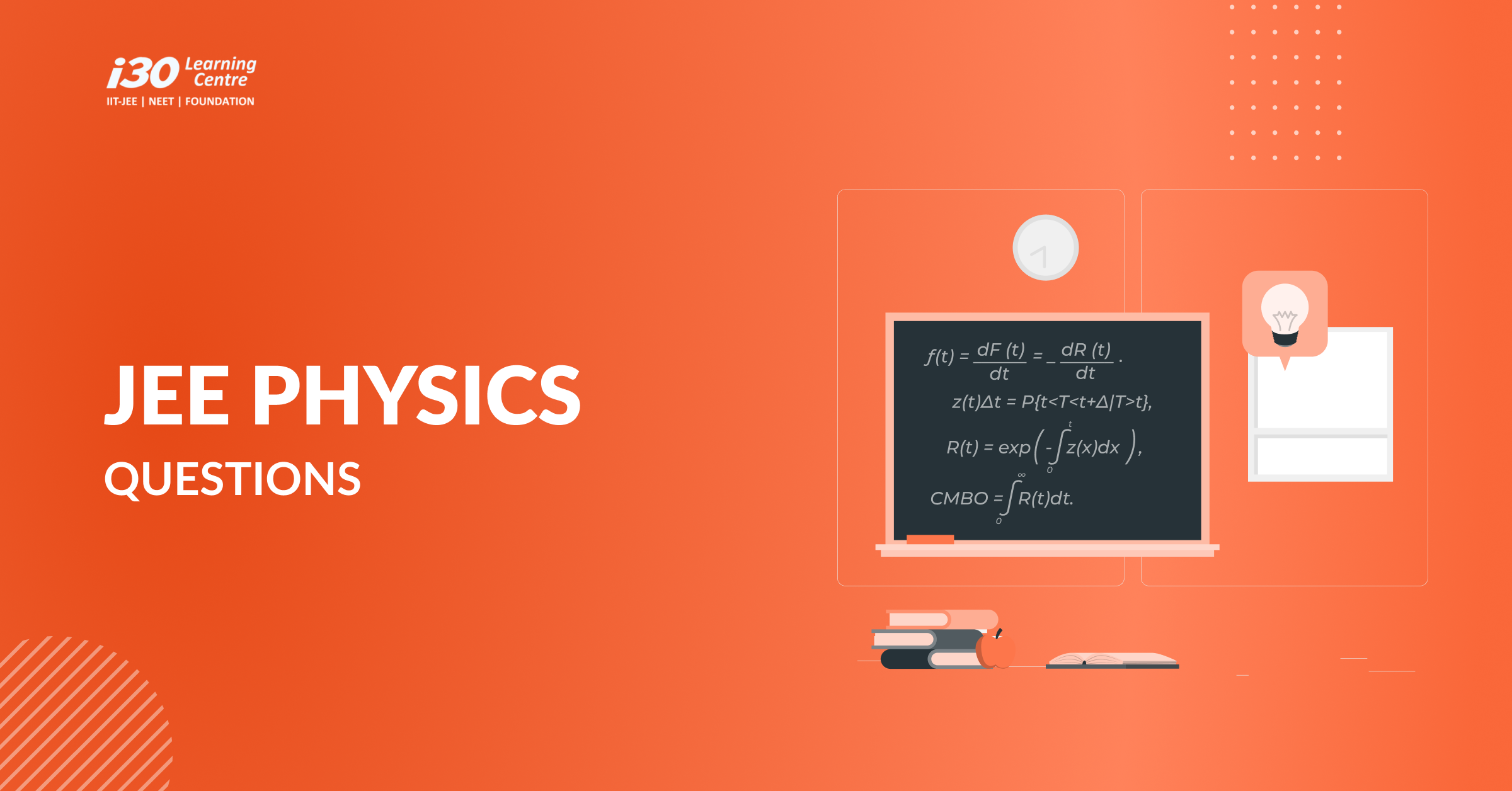Physics is a tough subject that requires in-depth understanding and practice. The JEE Main is one of the toughest exams, so a thorough understanding of all three subjects is mandatory.
To excel in the physics section, you need to get your basics right. In most cases, an aspirant cannot crack the JEE Main with just two or three months of preparation (few exceptions may exist).
You should start your preparation with the 11th standard itself. Make sure that you are practicing the previous year’s JEE physics questions after completing each chapter. From the very first day, you must work towards building a solid foundation in physics and the other two subjects.
JEE Main Physics Book
Physics is a tricky subject. You must have good conceptual knowledge of the topics in physics, in order to excel in JEE. The numerical aspect of this subject is simply an application of the concepts. Therefore, understanding the concepts is the first goal.
Once you have a decent understanding of the topics, the next step is to practice numerals. For this, try solving examples from your textbook and reference book. Once you are confident, try solving the previous year’s question papers on that topic or just practice unsolved numerical from a good practice book.
We have listed a few physics books that will boost your physics concepts:
1. NCERT Textbook for XI and XII
The NCERT books form the foundation for the JEE exams. The NCERT books cover all the topics of the JEE syllabus, so start your initial preparation with the NCERT books. This will help you prepare for your board exams as well.
2. Concepts of Physics (Vol. 1 and 2) by H.C Verma
It is a popular physics textbook among aspirants. This book has been a favorite among students for decades. This book thoroughly and methodically covers all the topics. In addition, the book has a lot of solved examples that help students’ conceptual understanding.
3. Fundamentals of Physics by Halliday, Resnick & Walker
This book is brilliant with numerical problems and provides wonderful concepts, too.
4. Understanding Physics by D C Pande (Arihant Publications)
The set of books by D. C. Pandey Mechanics (Vol. 1 & 2), Optics & Modern Physics and Waves & Thermodynamics has impressive explanations. This book is wonderful for problems as well. It has a good amount of solved and unsolved numerals.
5. Problems in General Physics by I.E Irodov
The book by Irodov is best for conceptual understanding of all topics.
6. Problems in Physics by SS Krotov
You must try the physics book by SS Krotov. This is one of the best books for solving problems.
Which is the hardest part of Physics JEE?
We have a list of the hardest topics in physics.
1. Electrostatics and Electromagnetism
These topics are linked to each other, and hence you should understand them well. The chapters are important for any entrance exam. However, the questions in JEE from these topics are pretty direct, and hence, with practice, you may score well in this section.
2. Modern physics
This is a very important topic and carries a good weightage in JEE exams. To excel in this section, you should have a good understanding of relativity and quantum physics.
3. Electromagnetic Induction
This is a very important topic in the JEE Main physics syllabus. Most of the aspirants find it difficult to solve problems in this section. Hence, devote more time to this topic and practice well.
4. Mechanics
It is an interesting topic. Devote time to understanding the concepts. The topics like oscillations, Newton’s law of motion, collisions, torque/rotational motion, and work and energy form the base of your physics concepts. If understood properly, you will enjoy solving problems in these sections.
5. Heat and Thermodynamics
Heat and thermodynamics are very important topics in the JEE Main syllabus. Though the topics seem easy at first, without suitable knowledge, they might become very confusing.
Is Physics Hard in JEE?
Physics is a tough subject and thus requires immense hard work and practice. You must have good conceptual knowledge of the topics in physics, in order to excel in JEE Mains and Advanced.
The physics section consists of both theoretical concepts and numerical. The numerical aspect of this subject is nothing but an application of the concepts. Therefore, understanding the concepts is the foremost goal.
Tips to Score Well in Physics
- As a JEE aspirant, you must have a strict schedule for studying.. Divide your time accordingly for all three subjects. Spend at least two to three hours on physics alone, apart from your regular classes and coaching. After your boards are finished, extend this time..
- Understand the syllabus and weightage of the topics. This will help you spend time judiciously on various chapters.
- Discuss your doubts with teachers and mentors, and listen to online lecturers. Try to solve them immediately.
- Refer to the NCERT textbook initially. The NCERT textbook forms the foundation, and aspirants shouldn’t avoid it.
- Along with NCERT, refer to a book for conceptual learning. Pay attention to your classes at school and at the coaching centers. Refer to the study materials and notes.
- Start practicing numerical skills after completing every chapter. Start with easy ones and eventually increase the level of complexity. Don’t jump directly to complex problems.
- Once you are confident, practice unsolved questions from that topic.
- Practice the previous year’s questions and mock tests on that topic.
- Make your own notes or purchase a formula book.
- Use sticky notes to note down important topics, confusion in topics, and anything you might forget later.
- Revise the concepts regularly; try to set aside a separate day for revision weekly. By doing so, you can revise all chapters studied throughout the week.
Is JEE Physics Tougher than NEET Physics?
JEE and NEET are two different exams. The JEE exam is for admission to engineering colleges, while the NEET exam is for admission to undergraduate medical courses. The National Testing Agency (NTA) conducts the National Eligibility Cum Entrance Test (NEET) for admission to undergraduate medical courses in government and other private colleges.
Physics and chemistry are common in both exams. The syllabus for both subjects is more or less the same. However, it is important to understand that the complexity of subjects in JEE and NEET is different.
The NEET exam is for admission to undergraduate medical courses, and therefore physics, in this case, is not that important. In India, there are significantly fewer medical colleges than there are engineering schools and colleges. Therefore, competition is tremendous in the NEET examination. Hence, we can see a clear-cut difference in the approaches to both exams.
The questions from the physics section in NEET are direct and subjective, while the JEE questions are more conceptual. JEE emphasizes more on the application of the concepts and numerical questions. Physics is the basis of engineering, and hence the level of difficulty.
A lot of students opt for PCMB (physics, chemistry, mathematics, and biology) combination for the plus 2 board exams. In such a scenario, a candidate can appear for both exams. Aspirants often manage physics and chemistry for these exams. But, it becomes very difficult for a student to focus on maths and biology at the same time.
Thus, have a logical goal first and then decide your path. Selecting both subjects may often distract you. Also, understand your strengths and passions before deciding on the subject.
FAQ: JEE Physics Questions
Is NCERT enough for physics JEE?
The NCERT books form the foundation for the JEE exams. These books cover all the topics of the JEE syllabus, so start your initial preparation with the NCERT books. But you cannot rely only on NCERT books for JEE Main and Advanced. Along with it, go for one or two books to enhance your concepts and numerical practice.
JEE Mains physics PYQ book
Some of the good JEE PYQ books are MTG 45 years JEE Advanced Previous Years Solved papers, Oswal JEE Advanced 21 years Solved papers, Disha 120 JEE Main Physics Online (2022 – 2012) & Offline (2018 – 2002) solved papers.
How many hours should I study Physics for JEE?
As a JEE aspirant, you must have a strict schedule for studying. Divide your time accordingly for all three subjects. Spend at least two to three hours on physics initially, apart from your regular classes and coaching. Increase this time after your boards are over.
To conclude
Physics is a tricky subject and forms the basis for engineering. Therefore, this subject is not only important for exams but also for your future. Have a systematic approach for each subject.
To score well in physics, devote a good amount of time daily. Understand the concepts properly, practice, and solve previous years’ JEE physics questions.
Hope you got your answer for JEE Physics Questions through the article.



